Reflections on Five Years of Making Art Through Programming
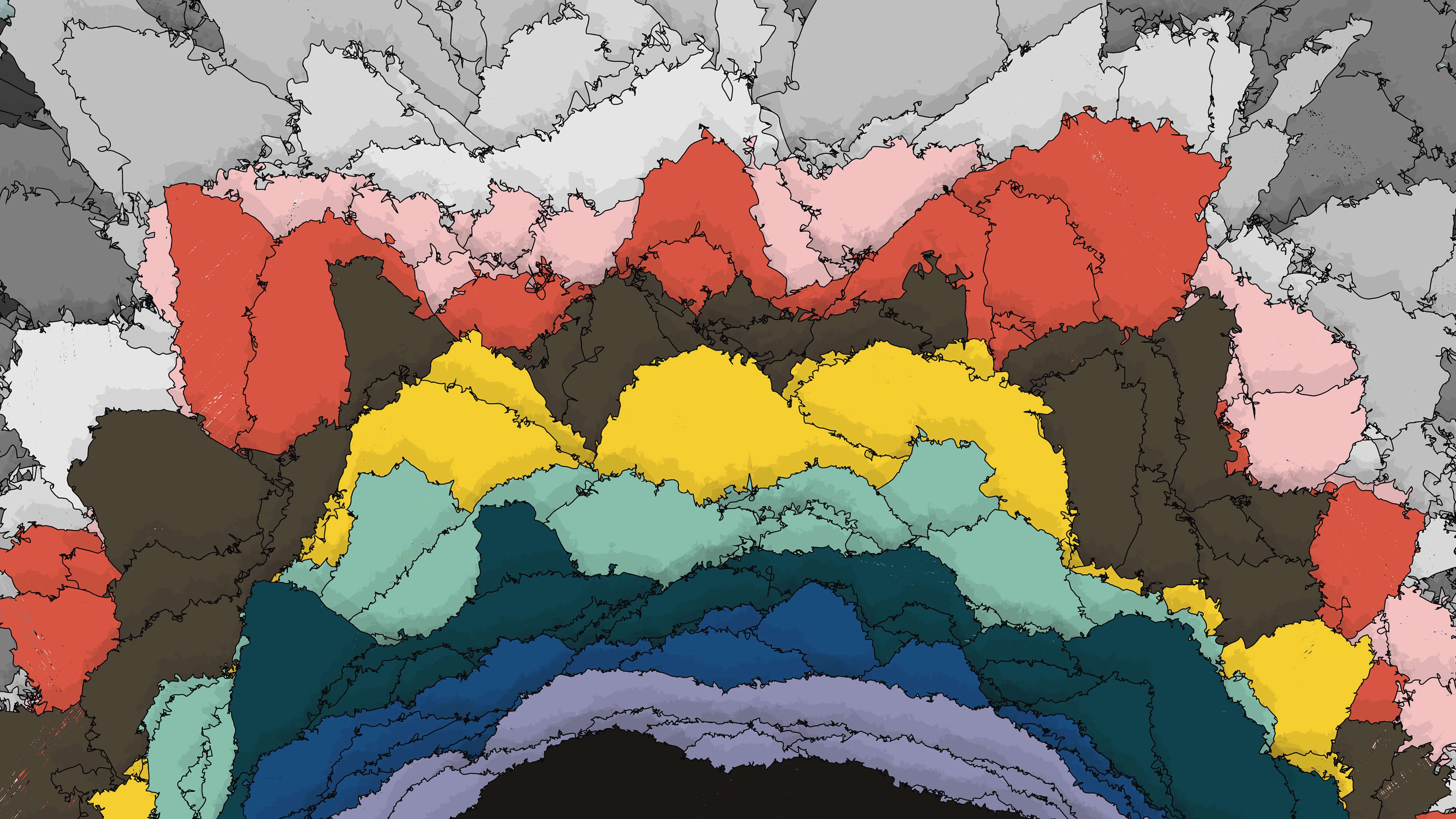
I recently passed the five year anniversary of when I started making generative art. This was also approximately when I decided to get “serious” about making art. It’s hard to take an exact count, but I think I’ve made 600+ generative works at this point. I think I’ve done okay for myself.
I wanted to take a little time to reflect on some of the big things I’ve learned during that time. I hope that by sharing these, it may help another artist.
Art Problems vs Programming Problems
When you're getting started, you probably think the programming parts of this work are tricky. True, it takes a while to get a good environment set up, to refresh your math skills in a few areas, and to learn how to use your libraries. These problems are solvable with a traditional "software dev" approach. You do some reading, copy some code from the internet, and add print statements to your code for debugging.
Now the hard part comes: you have to make something new. Not just copying a tutorial, but pulling it out of the ether. What the hell could you make that would be interesting? You fumble around until you get lucky. You take a half-baked idea, and mash at it until it's passable work. Congrats, you made something!
The next day comes. You sit down to make new work. You're back at the blank canvas. It's almost as if you had never made art before. In desperation, you throw something on the screen with the hope that it will be interesting, despite your feeling that it probably won't. You brute force your way to a completed work. After ten hours of work, what you've made looks okay, but not great.
You repeat this maddening cycle.
Making art never seems to get easy, somehow. The goalposts recede into the foggy distance, elusive. Sure, the work you produce gets better. But the mental energy it takes to produce it doesn't go down. If anything, it goes up. You realize that to make good art, you're going to have to work with emotions, put your trust in the most crazy parts of yourself, study everything around you, make peace with mostly being a failure, and repeat these steps for basically forever.
Writing code seems so trivial by comparison. It works, or it doesn't. Once you learn how loops work, you're more or less good to go on that front for all time. There are solid, mostly static tools that you can understand, analyze rationally, and depend on. It is important to know that understanding code in this way is like a painter understanding how pencils, pens, and paintbrushes work. It's needed for the work, but it ultimately doesn't help with the art problems all that much. You can't pretend that coding well will save your ass.
Making a Program with Good Variety
Before I made generative art, I did a lot of drawing and painting. As challenging as that is on its own (see above), the generative approach introduces an entirely new and complex problem. How do you make one program output a variety of images, with some of them still being good? You're not working towards a singular goal anymore, you're trying to develop a whole system, a whole process for constructing good images.
You're not working towards a singular goal anymore, you're trying to develop a whole system, a whole process for constructing good images.
This approach forces you to analyze the images in a different way. You have to find the general characteristics that make it work. What relationships between the elements are really key? Which ones are overly rigid, and could stand to be loosened up? Maybe there are a range of acceptable behaviors for any given element? How do the elements need to interact with each other?
This is a special part of generative work, and easily one of the most interesting. It's also one of the most difficult. I'd say only about one third of my works achieve a good level of variety while still producing some strong results. The scope of this challenge didn’t really sink in until I was several years into generative work.
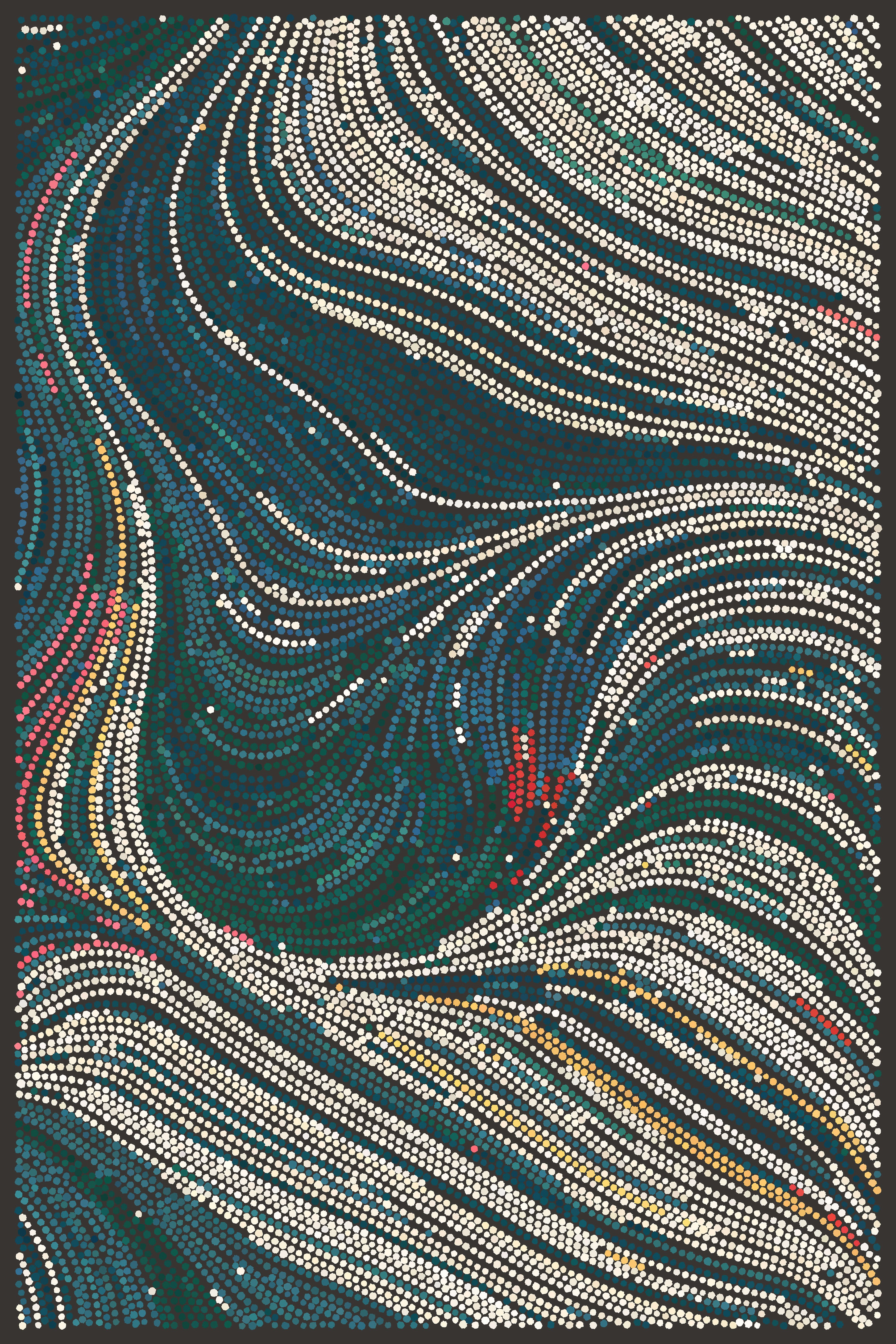
Outputs from Side Effects Inclue\d
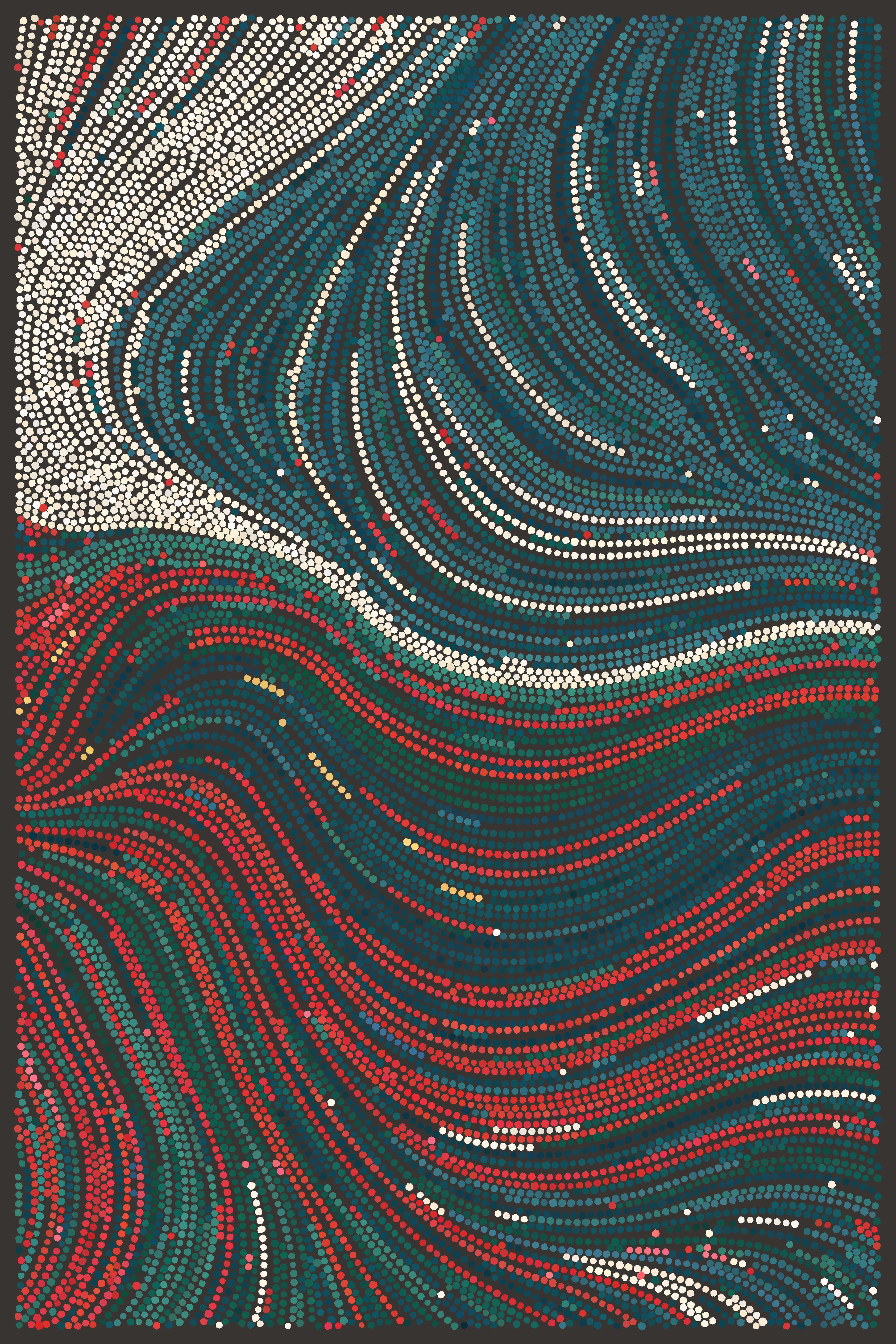
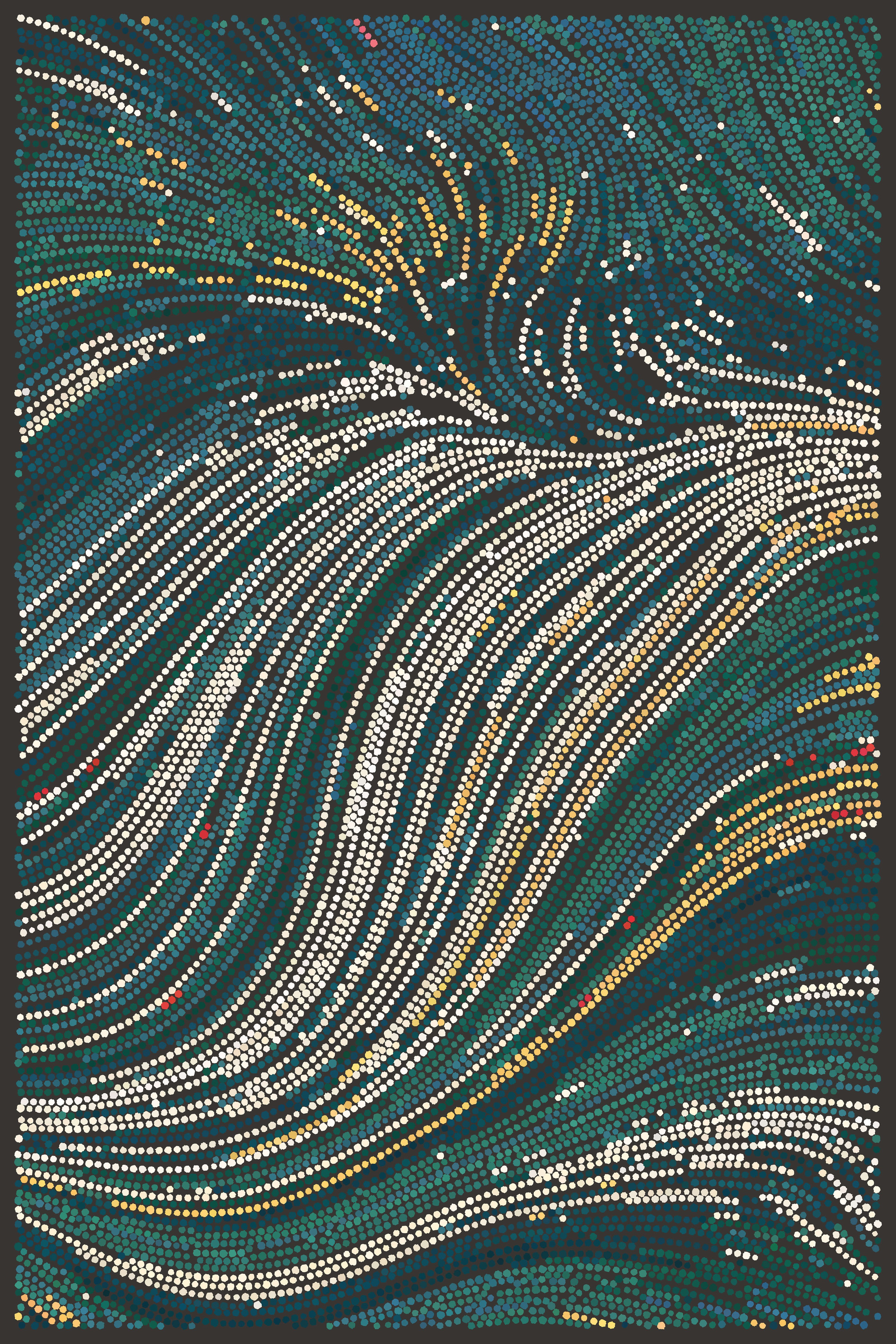
New Art Will Appear if You Put in the Time
I've felt like I'm surely "out of ideas" many times in these five years. Sometimes a short string of failed works (even just two or three) triggers this feeling. Even when things are going well, plans for the future are vague. I have no idea what I'll be making six months from now.
What I've been surprised to find is that "ideas" aren't really important. What is important is putting in time at the studio (or at the desk in your bedroom). When I physically make myself sit down and do something, new work comes out. I can even start with a premise like "this will be garbage, and I'm okay with that". After two or three rounds of garbage, something neat from the spirit realm happens to appear on my paper or screen and then I know what to work on.
This approach has never failed me, and now I know that I can trust it. I don't worry about being out of ideas any more. I just have to force myself to work, especially when I don’t want to.
Having a Dedicated Space
Mentally, having a dedicated space where you work on nothing but artwork is one of the most valuable gifts you can give yourself as an artist. No distractions, no excuses, no other concerns. You're there to put in your hours. Everything is set up and ready to go. The most productive time I've experienced as an artist is at the studio I rent, and I love it.
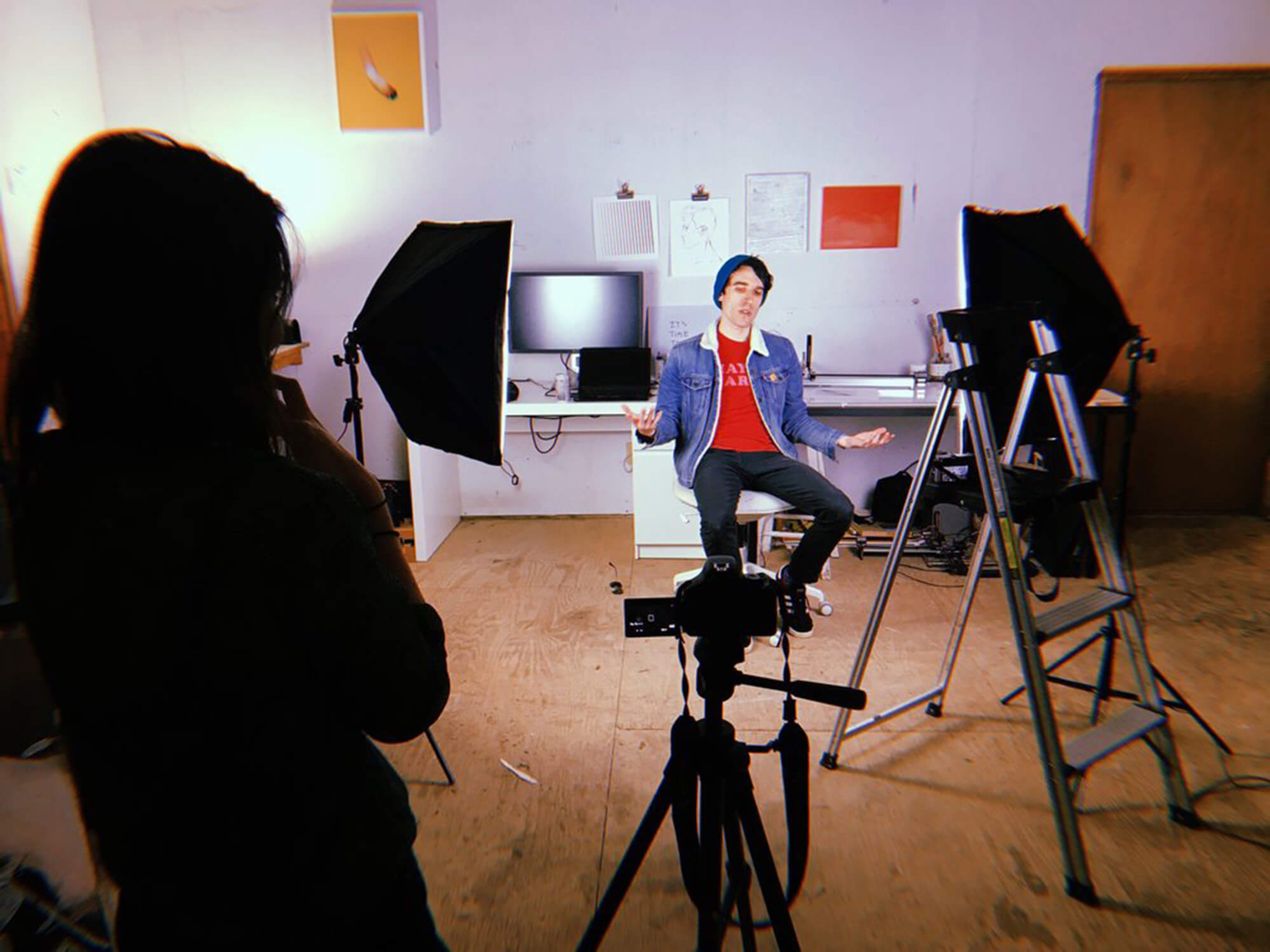
The artist in his studio, 2018
If You Want to Sell Your Art, There's a Crazy Amount of Work to Do
Making artwork, on its own, is challenging. If you want to develop the business side of that, it's a whole other thing. You need to be prepared to dedicate time to things like:
- Building a website
- Ordering prints
- Buying shipping materials
- Packaging art for shipping
- Going to the post office, filling out customs forms
- Posting your artwork online on various platforms
- Connecting with other artists, supporting them, and learning from them
- Doing taxes
- Responding to loads of random emails
- Photographing your work
- Editing photographs of your work
- Keeping your work organized, accessible, and backed up
- Framing your work (buying materials, cutting mats, etc)
- Hanging your work for shows
- Talking with folks who enjoy your work during opening receptions, studio tours, interviews, etc.
- Sending invoices
- Negotiating commissions and licensing deals
- Speaking about your work at events
- Delivering your work in person
- Reading about all the things you don't know about running a business, like marketing, accounting, and sales
- Writing about your work, including about a dozen variations of an artist's statement, which is possibly the least fun thing to write
This adds up to a large percentage of your time, often more time than you get to spend creating artwork. To me it's worth it, but it's been a reality of how my time gets spent the past couple of years. On the positive side, you can eventually bring on other folks to take on some of this work, but I'm sure it never entirely goes away.
Sometimes I wish I didn’t have to deal with any of that. But, I’m certain my work has grown because of it. Opportunities like exhibitions have pushed me to series of work that are a step above what I would do otherwise. Deadlines help to get work done.
Making Art Changes Who You Are
Maybe this sounds over the top, but deep down I think making art requires a level of involvement that changes who you are. It requires observation, reflection, careful sensitivity to your feelings, and outward honesty about those feelings. If you keep trying to improve your art, I think you'll find at a certain level that it requires you to improve yourself as a person as well. It doesn't seem like something you can fake easily.
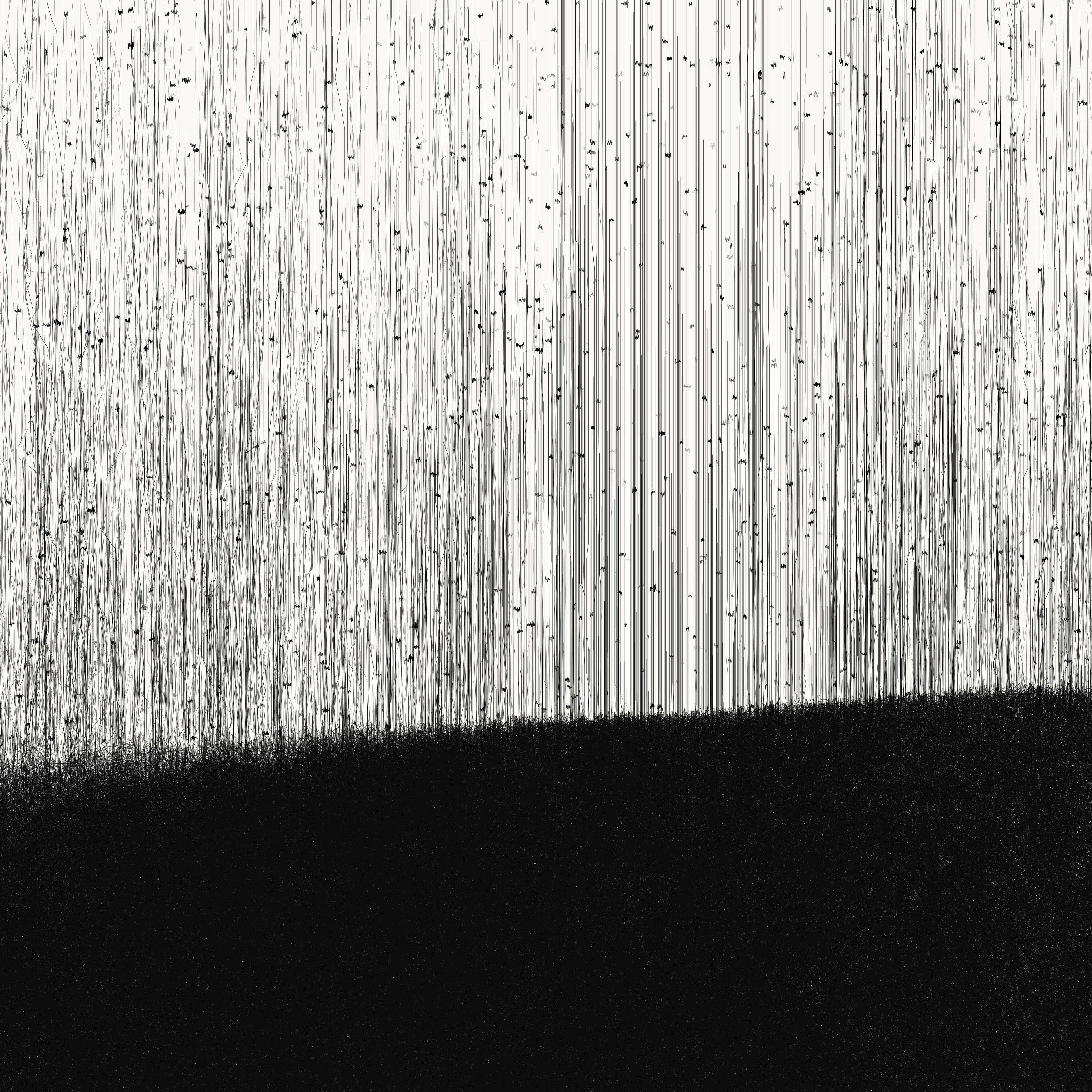
Afterwards, 2017
To me, that's a huge benefit of the work, even if it's uncomfortable. It’s a big part of why I decided to focus on art in the first place. I have a good share of deficiencies, as a person, that art has helped me to tackle.
Wrapping Up
If I had to summarize these five years, I'd say this: It's difficult, it's even more fascinating to me now than it was at the start, and I'm so glad that I have decided, over and over again, to continue making work.
–
From time to time, I write about my thoughts and artistic process. If you'd like to be notified the next time I publish an essay, sign up for my newsletter in the menu.